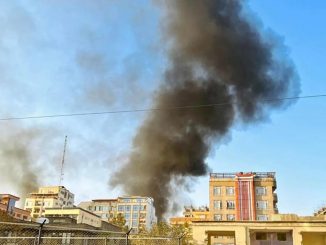
| Published April 24, 2025
At least 20 tourists were killed and dozens more wounded when gunmen opened fire at a popular resort in Indian-controlled Kashmir on April 22, 2025, in what officials are calling a devastating terrorist attack. The deadly assault, which targeted a group of vacationers, has sent shockwaves through the region and raised urgent concerns over the rising violence in Kashmir.
 Paramedics carry a wounded tourist on a stretcher at a hospital in Anantnag after assailants indiscriminately fired at tourists visiting Pahalgam, Indian-controlled Kashmir, Tuesday, April 22, 2025.
Paramedics carry a wounded tourist on a stretcher at a hospital in Anantnag after assailants indiscriminately fired at tourists visiting Pahalgam, Indian-controlled Kashmir, Tuesday, April 22, 2025.
A Horrific Attack at a Popular Resort
The attack occurred at a well-known tourist destination in Kashmir, a region known for its scenic beauty and its long-standing political tensions between India and Pakistan. Gunmen, believed to be linked to extremist militant groups, ambushed a group of tourists who were enjoying their stay at the resort. According to local police reports, the assailants began firing indiscriminately at the tourists, causing a massacre.
Indian officials confirmed that at least 26 people were killed, including citizens from various countries, as the attackers executed their assault with military precision. Early reports suggest that many of the victims were foreign nationals, adding an international dimension to the tragedy.
Details of the Attack and the Investigation
Local law enforcement officials quickly responded to the attack, but by the time they arrived, the gunmen had already fled the scene. No group has officially claimed responsibility for the attack, but Indian authorities suspect that militant groups with ties to Pakistan may be behind the assault. These groups have been active in the Kashmir region for decades, often targeting civilians and military personnel in the ongoing conflict between India and Pakistan over the disputed region.
The resort area, typically a haven for tourists, had been experiencing a rise in security measures in recent years due to the increasing threats of violence. However, the attack, which unfolded in broad daylight, has underscored the difficulty of securing such a vulnerable and volatile region.
India’s Foreign Secretary Vikram Misri specifically charged Wednesday press conference that “cross-border linkages of the terrorist act” had been “brought out” – in a clear reference to Pakistan. Authorities have identified that 25 victims were Indian, and one a Nepali citizen.
Regional Implications and Growing Tensions
The Kashmir region has been the site of numerous violent incidents in the past, with separatist groups pushing for greater autonomy or independence from India. The situation has escalated over the years, especially after India’s controversial revocation of Kashmir’s special status in 2019. This decision has led to increased military presence in the region and has heightened tensions with neighboring Pakistan, which claims Kashmir as part of its territory.
Experts have warned that the recent attack could further inflame tensions between India and Pakistan, both of which have nuclear capabilities and are locked in a decades-long territorial dispute over the region. The violence in Kashmir has also sparked concern among global leaders, many of whom have expressed their condolences and condemned the senseless loss of life.
The Growing Threat of Militancy in the Region
This attack highlights the persistent threat posed by militant groups operating in the region. While India has made significant efforts to combat terrorism in Kashmir, the region continues to see sporadic attacks targeting both civilians and military personnel. The rise of Islamist extremist groups has added to the complexity of the situation, as these groups continue to recruit new members and conduct operations.
The brutal execution-style killings of tourists have once again brought global attention to the situation in Kashmir, with calls for stronger international cooperation to combat terrorism in the region. Security experts have noted that while India has made strides in counterterrorism operations, the porous borders and the presence of extremist cells in the region remain significant obstacles.
International Reaction
International reactions have been swift, with governments worldwide condemning the attack and expressing solidarity with India. The United Nations issued a statement condemning the violence, while several countries, including the United States and the United Kingdom, offered their condolences to the victims and their families.
U.S. Secretary of State Antony Blinken condemned the attack, calling it “a horrific act of terror” and reaffirming the U.S.’s commitment to supporting India in its fight against terrorism. Similarly, the European Union and neighboring countries have offered assistance in any potential investigation into the attack.
Conclusion
The devastating terrorist attack on tourists in Kashmir serves as a grim reminder of the region’s ongoing instability and the persistent threat posed by extremist militant groups. While the attack has garnered international condemnation and heightened awareness of the security issues in the region, it also risks exacerbating the already fragile tensions between India and Pakistan. The tragedy underscores the urgency of finding a long-term, peaceful resolution to the Kashmir conflict—one that addresses the root causes of violence, fosters cooperation between regional powers, and prioritizes the safety and well-being of civilians.
As global solidarity grows, the focus must shift to strengthening counterterrorism efforts and ensuring the protection of both locals and visitors. However, without addressing the political and humanitarian issues that fuel extremism, tragedies like this will likely continue to haunt the region. For lasting peace and stability, the international community must work together to support comprehensive solutions that go beyond military action and focus on dialogue, human rights, and sustainable development.
SOURCES: ZEROHEDGE – Gunmen Execute 26 Tourists In Indian-Controlled Kashmir
THE NEW YORK POST – At least 26 tourists killed after gunmen open fire at Kashmir resort in ‘devastating’ terror attack: officials
AP NEWS – Militants kill at least 26 tourists at a resort in Indian-controlled Kashmir
ABC.NET – At least 26 people dead after militants attack group in India-controlled Kashmir
CNN – Dozens killed as gunmen massacre tourists in Kashmir beauty spot





Be the first to comment